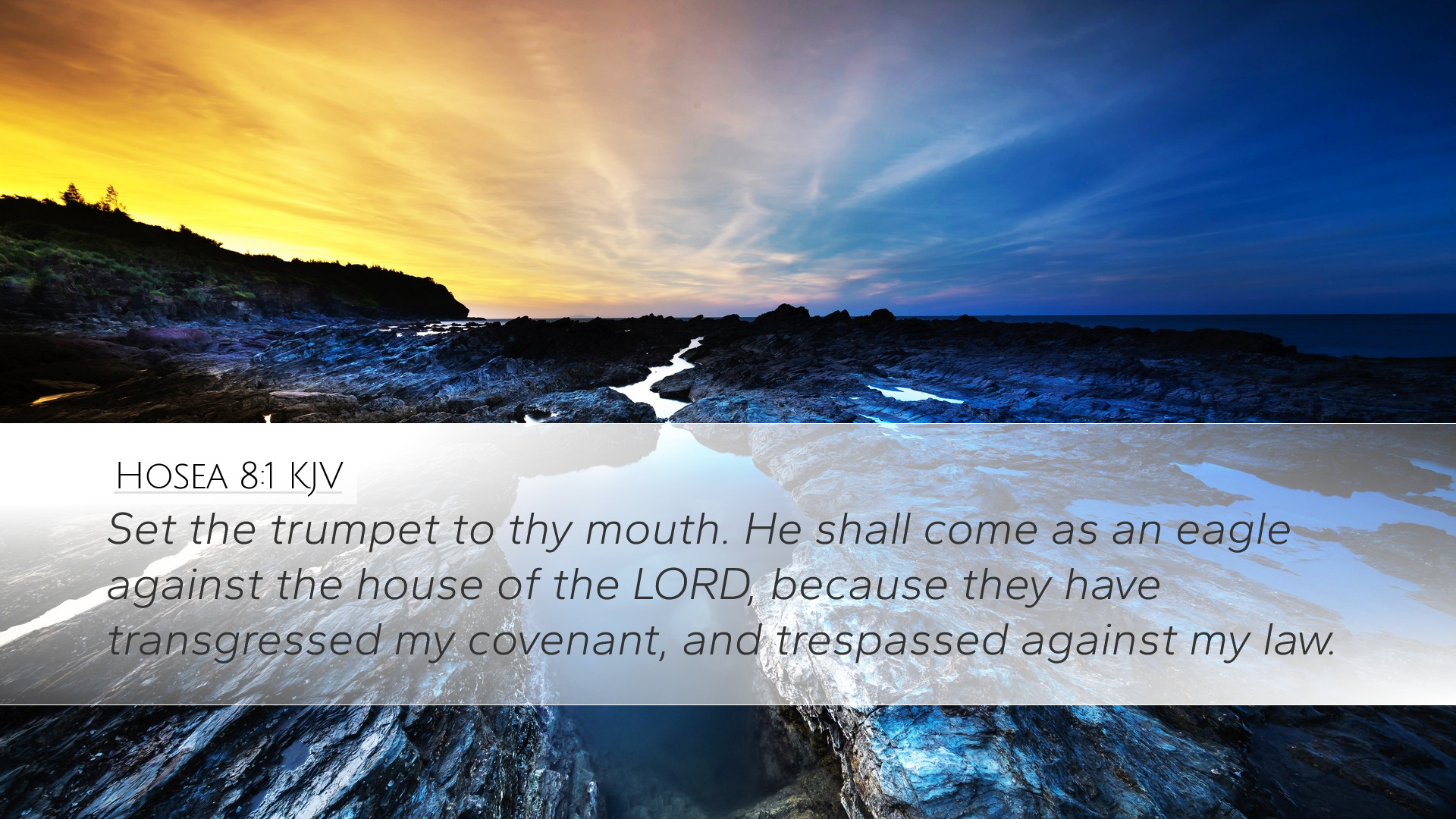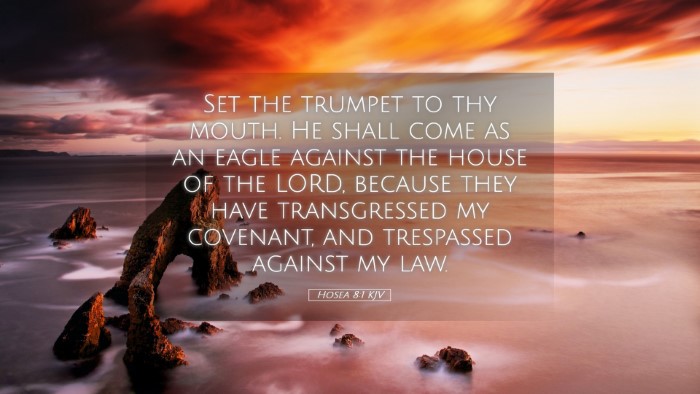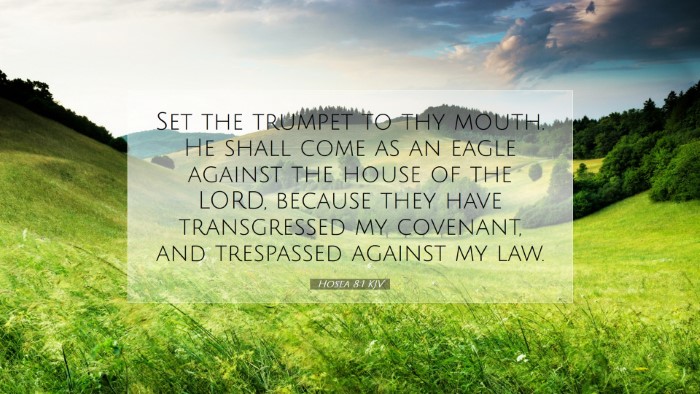Old Testament
Genesis Exodus Leviticus Numbers Deuteronomy Joshua Judges Ruth 1 Samuel 2 Samuel 1 Kings 2 Kings 1 Chronicles 2 Chronicles Ezra Nehemiah Esther Job Psalms Proverbs Ecclesiastes Song of Solomon Isaiah Jeremiah Lamentations Ezekiel Daniel Hosea Joel Amos Obadiah Jonah Micah Nahum Habakkuk Zephaniah Haggai Zechariah MalachiHosea 8:1
Hosea 8:1 KJV
Set the trumpet to thy mouth. He shall come as an eagle against the house of the LORD, because they have transgressed my covenant, and trespassed against my law.
Hosea 8:1 Bible Commentary
Bible Commentary on Hosea 8:1
Bible Verse: "Set the trumpet to your mouth. He shall come like an eagle against the house of the Lord, because they have transgressed my covenant and rebelled against my law." (Hosea 8:1)
Introduction
The verse Hosea 8:1 stands as a stark warning to the people of Israel regarding their impending judgment and the consequences of their disobedience. This commentary brings together insights from Matthew Henry, Albert Barnes, and Adam Clarke to provide a comprehensive understanding of this text in a manner that is meaningful for pastors, students, theologians, and Bible scholars.
Contextual Analysis
Historical Background: Hosea prophesied during a tumultuous time in Israel's history, marked by political instability, moral decay, and spiritual apostasy. The nation had turned away from the covenant relationship established with God, seeking after idols and foreign powers.
Literary Structure: Chapter 8 is a part of a larger discourse where Hosea delivers prophecies that address the transgressions of Israel. The imagery of the trumpet signifies a call to attention, marking the gravity of the message. In ancient Israel, the trumpet was often used to signal war or divine judgment.
Commentary Insights
-
Matthew Henry:
Matthew Henry highlights the urgency of God’s message to the people. The phrase "set the trumpet to your mouth" signifies a declaration of alarm. It emphasizes the need for the watchmen of Israel to be vigilant in sounding warnings against the impending destruction due to their disobedience.
Henry points out that the eagle represents the swiftness of God's judgment. Just as the eagle attacks swiftly and stealthily, so shall the judgment of God come suddenly against those who violate His covenant.
-
Albert Barnes:
Barnes notes that the trumpet call serves as both a warning and an announcement of impending trouble. It serves to awaken a slumbering nation to the reality of their spiritual state. He emphasizes that the "house of the Lord" refers to both the physical temple and the broader spiritual community of Israel.
He further explains the significance of the terms "transgressed my covenant" and "rebelled against my law." This shows the willful nature of Israel's sins, indicating that their disobedience was not out of ignorance but rebellion against divine authority.
-
Adam Clarke:
Clarke elaborates on the metaphor of the eagle, affirming that it signifies the speed and inevitability of judgment. He warns that the consequences of breaking God’s commandments are fatal, and the historical context illustrates Israel’s reliance on their own strength rather than on God.
Clarke also comments on the lamentable state of the people who have turned their backs on the divine law. He encourages readers to reflect on their own lives and communities, identifying areas of covenant disobedience that may lead to spiritual decline.
Theological Reflection
This verse prompts deep theological reflection on the nature of divine judgment and human responsibility. The trumpet call is a summon to repentance. It urges believers to examine their relationship with God and to recognize the severe implications of turning away from His commandments.
The theme of rebellion against divine law raises pertinent questions for contemporary faith communities. How often do we, like Israel, find ourselves in spiritual decline due to neglect or outright rebellion against God’s statutes? This text challenges us to consider the grace of God in the face of our transgressions and the call to return to covenant faithfulness.
Practical Applications
-
Call to Vigilance:
Just as Hosea called for the trumpet to be sounded, modern believers must be vigilant in observing their spiritual condition and that of their communities. Leaders and pastors are encouraged to sound the alarm against complacency.
-
Emphasizing Covenant Faithfulness:
There is a need to teach and reinforce the importance of living in accordance with God’s covenant. Understanding the gravity of rebellion can lead spiritual leaders to instill a deeper commitment to obedience among their congregants.
-
Encouraging Repentance:
The message of Hosea includes hope. It invites reflection on our own lives and encourages a response of repentance, assuring congregants that returning to God brings restoration even after straying.
Conclusion
Hosea 8:1 serves as a poignant reminder of the consequences of turning away from God’s law. The warnings encapsulated in this verse reflect a broader narrative of call and response, where the grace of God beckons His people back to Himself. As we engage with this text, let us heed the trumpet's call, acknowledging our need for vigilance, repentance, and a renewed commitment to covenant faithfulness.


